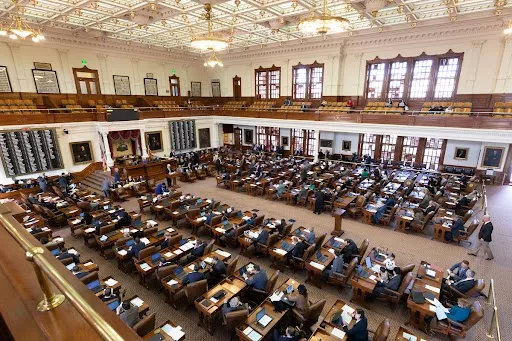
The floor of the Texas House of Representatives in session. Photo by Al Braden.
Another legislative session is underway, and Texans are likely looking ahead with caution. Understandably so. Many bills that the Lege focuses on are not good for Texans or the planet. But, believe it or not, beneficial things have happened for the environment inside the Texas Capitol in recent sessions – and the opportunity for more positive legislation remains if we can work with each other and build our people power. Here we take a look at three of the most impactful pieces of environmental legislation of the last 10 years. This shows us all that good things come to those who fight together.
Statewide Flood Planning
In 2019, a bipartisan showing of lawmakers in the 86th Legislature passed Senate Bill 8, which created Texas’s first statewide flood planning process. It had been two years since Hurricane Harvey devastated Houston, Rockport, and other coastal communities, and this legislation aimed to use money from the state’s Rainy Day Fund to support regions across the state in creating individualized flood plans that would aim to avoid the Harvey scale of disaster. SB 8 also touched on issues of environmental justice, since many communities that experience flooding and the impacts of hurricanes are marginalized and lower income.
“SB 8 reaffirmed the importance of local involvement in resilience and disaster planning,” said Alex Ortiz, Water Resources Specialist for the Sierra Club Lone Star Chapter. “Preventing flooding across Texas is something that must include substantial community input, and the bill represented a commitment by the Legislature to not only plan for the future but to also ensure that frontline communities get to lead.”
This statewide flood planning process is currently taking place, and when it’s finished, Texas should be in a stronger position to better weather such climate events. In the current 88th legislative session, we’d love to see action on addressing the causes of climate change, like better regulating flaring in oil and gas operations.
There is talk of the 88th session being “a water session,” with our partners at the Texas Living Waters Project encouraging legislators to scrap partisanship and make changes. Ortiz will be advocating at the Capitol for increased focus on the water and climate nexus, including getting the State Climatologist’s office involved in state water planning and flood planning, as well as restoring Texas’s coastal salinity gradients that are likely to see additional stress from climate change.
Building Codes
Perhaps no piece of recent legislation better represents the power of compromise than House Bill 1736 in 2015, which adopted the most recent energy codes for all new homes and commercial construction built in Texas. Though we had to accept a few concessions for the big corporate homebuilders, we knew the codes could lead to a 10-23% improvement in efficient energy usage in new homes – and less energy means less fossil fuel power plant pollution and cleaner air. The codes also help conserve water and lower utility bills for those living in them. And better building codes mean needed improvements to appliances, windows, insulation, duct work, and lighting, leading to job growth in those industries. All of this sounded worth the compromise.
“Requiring all construction in Texas to meet modern energy codes has been vital to lowering our electric demand and lowering air pollution,” said Cyrus Reed, Conservation Director of the Lone Star Chapter. “Every home, apartment, or commercial building can operate for decades or longer, and getting them constructed as energy and water efficient as possible is important for everyone. This session we are going to build on this work to make sure the state ultimately adopts the 2021 codes.”
Money for Parks
With SB 26 in 2019 lawmakers approved a constitutional amendment letting Texas voters decide whether to always fund the Texas Parks and Wildlife Department with the maximum 94% of sporting goods sales taxes. Because no minimum had been mandated, the Legislature would sometimes send just 40% of this revenue to TPWD. As the Lone Star State’s population swelled in recent years, the state parks system was in desperate need of updates, repairs, maintenance, expansions, and more.
The constitutional amendment went to voters in November 2019, and 88% of them approved the proposition to amend the Texas Constitution. The reliable funding has greatly aided TPWD, which oversees more than 80 state parks and other facilities that provide crucial access to the outdoors for all people in Texas.
Looking Ahead
In addition to our small number of meaningful wins on environmental legislation, some of our biggest victories come from building power through collaboration and support across race, class, and political district lines. Coalitions have demonstrated this in work to fight anti-protest laws, to (almost) stop Energy Transfer billionaire Kelcy Warren's nomination to TPWD, to advance our policy goals on energy efficiency and storm response last session, and to hopefully come together in 2023 for the Sunset legislation of several environmental agencies.
Stay tuned to the Legislature section of our website to keep up to date with important legislation. There you will find our bill tracker, factsheets, testimony, and more information on how to get involved in fighting for good, sound policy this legislative session. Our communities and environment need all the voices they can get, and this is a long game not a short one. We need to deepen our skills and connect across movements to build the power to win.